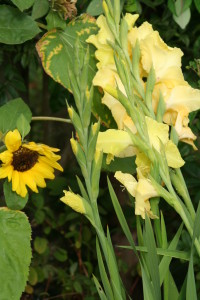Prize Gladioli Growing & Showing
 The Gladiolus family are fine addition to the colourful garden. They also make fascinating subjects for the gardeners who like a challenge of the show bench.
The Gladiolus family are fine addition to the colourful garden. They also make fascinating subjects for the gardeners who like a challenge of the show bench.
Tips for Growing Prize Gladioli
- Raised beds are good for soil fertility and can help you get some stonking great Gladioli.
- Mulch the bed heavily to reduce the amount of watering you need to do and feed with blood fish and bone.
- Plant 6″ deep and at least 4″ apart (more for show varieties).
- Do not plant dormant corms but wait until small root swellings appear around the base.
- Dust or dip in fungicide before planting.
- Plant when the soil has warmed up on a layer of sand or vermiculite to aid drainage.
- To keep the stems straight tie to a cane below the first bud and add loose ties as it grows.
- A tee-pee of horticultural fleece can help prevent late frost damage or the bleaching effect of too much sun on red gladioli.
- During the heat of the day tease flowers forward to get them to open to the front – in the cold they will break off.
- Leave at least 4 leaves on the plant when cutting to ensure the new corm swells.
- Lift 5-6 weeks after flowering, dry off, label and store for next year.
Show blooms
- Buy corms of quality varieties that are know to do well on show benches.
- Some varieties can grow up to 7 feet tall and are not suitable for garden decoration.
- Varieties are classified with a 3 digit number according to size, colour and intensity of colour. The first number 1 for a miniature under 2.5″ to 5 for a giant over 5.5″ the second number 0 is white up to 9 for dark brown or tan flowers thirdly 2 is for light colours, 4 for medium and 6 for for deep shades (odd numbers are for streaked or marked flowers). So 301 might be a medium white flower with freckles.
- For exhibition plants strip off the outer skins to expose the bud eyes and prior to planting carefully remove with a knife, all the bud eyes except the largest one near the crown.
- 24″ spikes destined for exhibition should have florets with petals that are fully hydrated and show no sign of aging or insect damage.
- One-third of a spike should have florets in full bloom, the middle one-third showing color and the upper one-third in bud. The optimum may be 6-7 individual blooms or florets open at show time. They can be held back with a wrapping of stocking net or foil.
- Florets should be evenly spaced and all facing in the same direction, coax individual floret blooms to face the front with a piece of dowel.
Old Show Varieties
- These varieties are renown for opening 10 florets or more at the same time:
- athlone, bow bells, chinook, cotillion, doctor fleming,
- evangeline, firebrand, moonlight glow, noweta rose,
- tahoe, sunspot,pinnacle, snow velvet, polynesia
6 thoughts on “Prize Gladioli Growing & Showing”
Advice on how to overwinter and prepare bulbs for re-planting following season please
On a warm day 6 weeks after cutting the spike (whilst still green) dig up the corm and cormlets. cut off the stalk and roots but not the old corm just yet. Dry quickly in a greenhouse, airing cupboard or garden shed. Dust with insecticide and sulphur as added protection. Store through winter in dry air at +70 degrees F.
Corms will not withstand frost and do not like wet conditions although some deeply planted varieties may survive in the ground.
where can i buy the corms from?
I just got my new season catalogue from ‘Showglads’ 105 Derby Rd Bramcote Notts NG9 3GZ
Usefull tips and will try growing exhibition types. Thank you
Comments are closed.